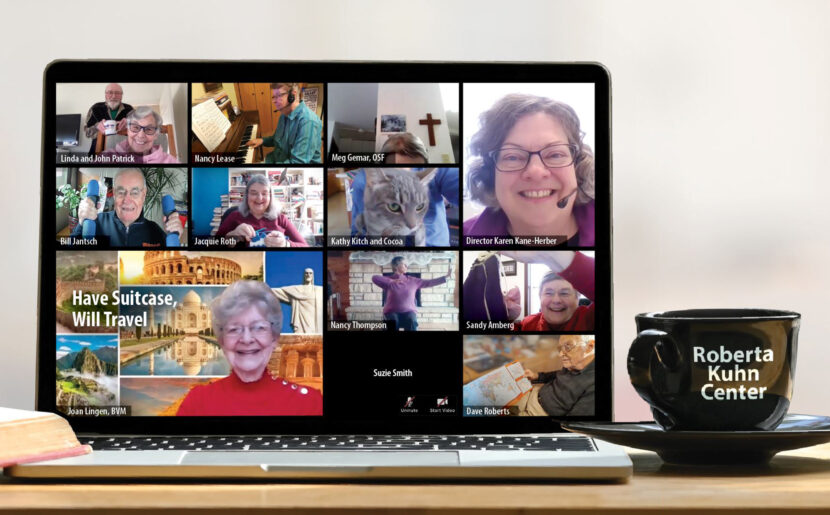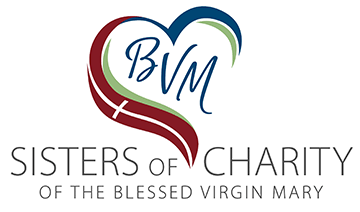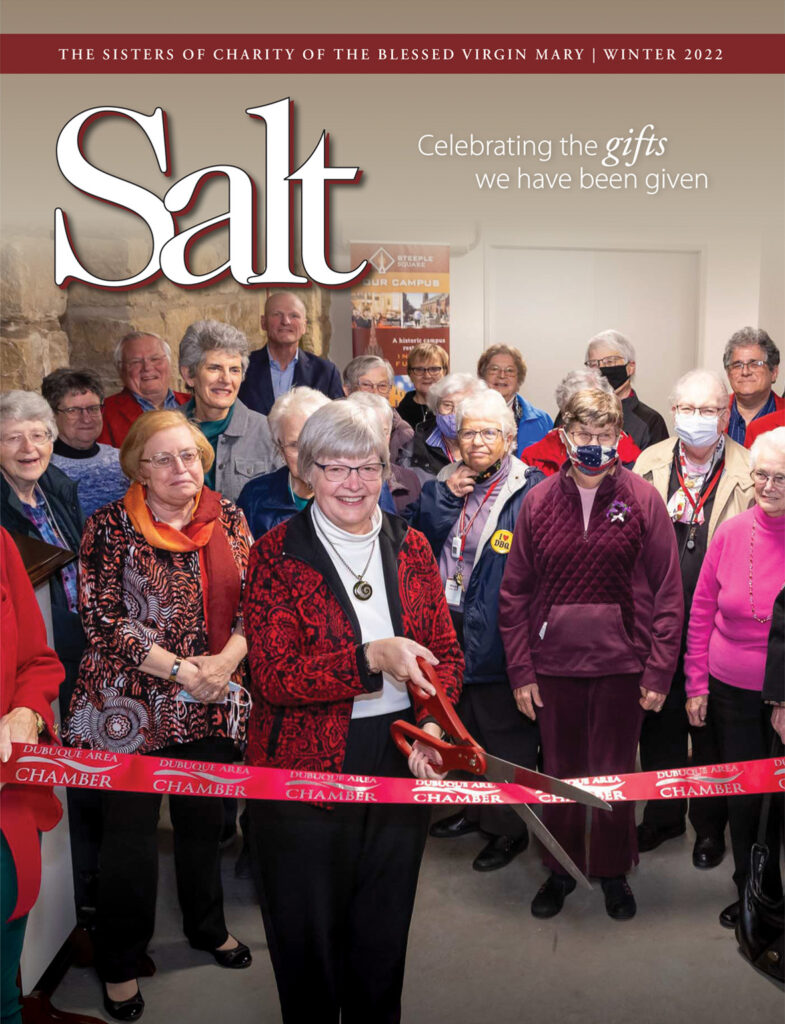Zooming into the Future: Roberta Kuhn Center Goes Virtual

Preparing for Change
Trying to sustain community while remaining apart is not an easy task. And, though we are not alone in our struggles as we face the pandemic, we may encounter a different set of challenges. How do we remain committed to providing classes to our friends in the Dubuque community when technology may be their foe? This question is one that Karen Kane-Herber has asked since having the last in-person Roberta Kuhn Center (RKC) class in March 2020. As the center’s director, Karen was tasked with adapting a long-standing in-person platform to something entirely new and online.
Since 1982, RKC at Mount Carmel in Dubuque, Iowa, has been a gathering place that provides enrichment and socialization for women and men 55+—with the average participant’s age at about 80. With this in mind, how do we still offer enrichment opportunities and fulfill the need for community in this new way? How do we do it well?
Adjusting to Change
The value of the courses is directly related to the content, preparation, and instruction of the teachers. As COVID-19 changed how the classes were delivered, it also changed the way the instructors needed to think about their classes. How can they still engage, challenge, and support the student, while creating a connected classroom environment over the internet? How do they personally stay motivated and excited to try something new? Karen shares that the volunteer instructors have different levels of comfort with switching to the online format. This group of volunteers include BVM sisters, other women religious, and many lay women and men. They bring their professional experiences in the fields of education, the arts, and healthcare and wellness to the classrooms. Out of respect for these varying comfort levels, Karen was careful not to force things. As a result, some classes are on hold until in-person instruction can take place. Finding a balance between the needs of the instructors and the needs of the students took a lot of teamwork . . . on both sides of the camera. With continuous encouragement from congregational leadership, especially BVMs Lou Anglin, and Carol (Joseph Louis) Marie Baum, “You got this, Karen” . . . “What do you need?” . . . the team made it work. Consulting with instructors to adapt course content, helping students, lay people, and sisters learn how to navigate their computers, get the right equipment, access emails, sign on to Zoom, and work their mics and cameras, was a huge undertaking, but one Karen reflects on positively. “I’m really proud of us. We were able to turn this around in a relatively short period of time, with great results.” Karen adds, “The success of the online program is a litmus test to the value of our classes and our RKC community in peoples’ lives.”
Thriving during Change
Classes ranging from foreign policy, travel, and yoga to book club and writing for relaxation and conversation have all made the jump to the online superhighway with few bumps along the way. In fact, over 220 participants are currently enrolled. One of the beautiful surprises of this trying time is that not only did everyone rise to the challenge—they have thrived. The course, “Have Suitcase, Will Travel,” taught by BVM Joan (Ramone Mary) Lingen, saw a great increase in student numbers. When the course was offered in-person, due to the confines of classroom walls, enrollment was limited to 20 people. Now, this virtual trip around the world of artistic wonders has grown to 88 people from across the country, including a group from a local nursing home. In her Dubuque Telegraph Herald interview, Lingen shares, “I don’t tell the class until the week before where we’re going the next week . . . the things we’re looking at, we couldn’t have done that in an in-person class.”
Students aren’t the only ones enjoying the “expanded” classroom. Instructors are now able to teach from anywhere. One instructor recently moved from Peosta, Iowa, to Corvallis, Ore., and hasn’t missed a beat with Book Group. Expanded classrooms have expanded opportunities. Virtual classrooms have created openings for guest presenters to share their expertise, including Dr. Alison Johnston, Oregon State Professor, expert on Brexit; Dr. Steve Bougher, University of Michigan professor, expert on Mars; Lois Norrgard, Alaskan Wilderness League, expert on arctic wildlife and Indigenous peoples; and Dr. Roger Shafer, local mental healthcare professional, expert on mental health during the COVID pandemic. According to Karen, the Zoom format has not only broadened access to instruction but also to some much-needed social time. There is a “great energy when the students come together.” Students are signing into class up to 15 minutes early to connect, ask for help, and just talk. What took place in the halls of the RKC is now happening from living rooms, community rooms, and vacation homes across the country. What was once new—maybe even scary—has become second nature as students become comfortable with the technology—maybe even too comfortable.
Karen laughs as she shares some of the fun moments that take place in a Zoom classroom—from the camaraderie and laughter to someone forgetting they are on camera or that their mic is on. These days, a sense of humor, a gentle reminder, and a mute button are a director’s best friends. Karen jokes that a mute button might have been handy during her teaching days in a traditional classroom. Former BVM teachers might agree.
Overall, the experience of converting the RKC courses to Zoom has been positive. The goals of the RKC program offerings are to create a warm, loving atmosphere in which all senior citizens of Dubuque and the surrounding area feel welcome; to provide enrichment to stimulate the mind, body, and spirit; and to strengthen attitudes that growing older means growing better. They have done
just that and done it well.
The hope remains for classes to be in-person again, but perhaps Zoom will continue to play a role in the RKC classroom—muted or unmuted.
WINTER 2022: CELEBRATING THE GIFTS WE HAVE BEEN GIVEN
In this issue of Salt, the Sisters of Charity of the Blessed Virgin Mary adapt and thrive during the pandemic, use their gifts in ministry in ways that carry out the BVM core values, express gratitude to supporters and donors, and take strides to preserve BVM history.
If you would like to receive Salt, contact the Office of Development for a complimentary subscription at development@bvmsisters.org or 563-585-2864.

